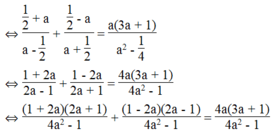Cho phương trình ẩn x (x+a)/(x+2)+(x-2)/(x-a)=2 a/ Giải phương trình với ẩn a=4 b/ Tìm các giá trị của a sao cho phương trình thừa nhận x=-1
Hãy nhập câu hỏi của bạn vào đây, nếu là tài khoản VIP, bạn sẽ được ưu tiên trả lời.


1. a = 3 thì phương trình trở thành:
\(\frac{x+3}{3-x}-\frac{x-3}{3+x}=\frac{-3\left[3.\left(-3\right)+1\right]}{\left(-3\right)^2}-x^2\)
\(\Leftrightarrow\frac{\left(x+3\right)^2+\left(3-x\right)^2}{\left(3-x\right)\left(3+x\right)}=\frac{-3\left[-9+1\right]}{9}-x^2\)
\(\Leftrightarrow\frac{x^2+6x+9+x^2-6x+9}{\left(3-x\right)\left(3+x\right)}=\frac{-3.\left(-8\right)}{9}-x^2\)
\(\Leftrightarrow\frac{2x^2+18}{9-x^2}=\frac{24}{9}-x^2\)
\(\Leftrightarrow\frac{2x^2+18}{9-x^2}+x^2=\frac{24}{9}\)
\(\Leftrightarrow\frac{2x^2+18+9x^2-x^4}{9-x^2}=\frac{24}{9}\)
\(\Leftrightarrow\frac{11x^2+18-x^4}{9-x^2}=\frac{24}{9}\)
\(\Leftrightarrow99x^2+18-9x^4=216-24x^2\)
\(\Leftrightarrow9x^4-123x^2+198=0\)
Đặt \(x^2=t\left(t\ge0\right)\)
Phương trình trở thành \(9t^2-123t+198=0\)
Ta có \(\Delta=123^2-4.9.198=8001,\sqrt{\Delta}=3\sqrt{889}\)
\(\Rightarrow\orbr{\begin{cases}t=\frac{123+3\sqrt{889}}{18}=\frac{41+\sqrt{889}}{6}\\t=\frac{123-3\sqrt{889}}{18}=\frac{41-\sqrt{889}}{6}\end{cases}}\)
Lúc đó \(\orbr{\begin{cases}x^2=\frac{41+\sqrt{889}}{6}\\x^2=\frac{41-\sqrt{889}}{6}\end{cases}}\Leftrightarrow\orbr{\begin{cases}x=\pm\sqrt{\frac{41+\sqrt{889}}{6}}\\x=\pm\sqrt{\frac{41-\sqrt{889}}{6}}\end{cases}}\)
Vậy pt có 4 nghiệm \(S=\left\{\pm\sqrt{\frac{41+\sqrt{889}}{6}};\pm\sqrt{\frac{41-\sqrt{889}}{6}}\right\}\)

a) Với a=4 thì phương trình bằng \(\frac{x+4}{x+2}+\frac{x-2}{x-4}\)= 2 với đkxđ: \(x\ne2,4\)
Giải phương trình: \(\frac{x+4}{x+2}+\frac{x-2}{x-4}\)= 2 => \(1+\frac{2}{x+2}+1+\frac{2}{x-4}=2\)
=> \(\frac{2}{x+2}+\frac{2}{x-4}=0\Rightarrow\frac{1}{x+2}+\frac{1}{x-4}=0\)
=> \(\frac{\left(x-4\right)+\left(x+2\right)}{\left(x+2\right)\cdot\left(x-4\right)}=0\)=> 2x-2=0 => x=1 (thỏa mãn đkxđ)
Vậy x=1
b) Với x=-1 => \(\frac{a-1}{1}+\frac{-3}{-1-a}=2\)(đkxđ: a không bằng -1)
=> \(\left(a-1\right)+\frac{3}{a+1}=2\)
=> \(\frac{a^2-1+3}{a+1}=2\)=> \(a^2+2=2\left(a+1\right)\Rightarrow a^2-2a=0\)
=> \(a\left(a-2\right)=0\)=> a = (0; 2) (thỏa mãn đkxđ)
Vậy để phương trình có nghiệm x=-1 thì a={0; 2}

\(\text{a) Thay a = 4 vào pt ta có:}\)
\(\frac{x+4}{x+2}+\frac{x-2}{x-4}=2\)
\(\Leftrightarrow\frac{\left(x-4\right)\left(x+4\right)+\left(x-2\right)\left(x+2\right)}{\left(x+2\right)\left(x-4\right)}=2\)
\(\Leftrightarrow\frac{x^2-16+x^2-4}{x^2-4x+2x-8}=2\)
\(\Leftrightarrow\frac{2x^2-20}{x^2-2x-8}=2\)
\(\Leftrightarrow2x^2-20=2.\left(x^2-2x-8\right)\)
\(\Leftrightarrow2x^2-20=2x^2-4x-16\)
\(\Leftrightarrow2x^2-2x^2+4x=-16+20\)
\(\Leftrightarrow4x=4\)
\(\Leftrightarrow x=1\)
\(\text{b) Thay x = -1 vào pt ta có:}\)
\(\frac{-1+a}{-1+2}+\frac{-1-2}{-1-a}=2\)
\(\Leftrightarrow\frac{a-1}{1}+\frac{-3}{-\left(a+1\right)}=2\)
\(\Leftrightarrow\left(a-1\right)+\frac{3}{a+1}=2\)
\(\Leftrightarrow\frac{\left(a-1\right)\left(a+1\right)+3}{a+1}=2\)
\(\Leftrightarrow\frac{a^2-1+3}{a+1}=2\)
\(\Leftrightarrow a^2+2=2.\left(a+1\right)\)
\(\Leftrightarrow a^2+2=2a+2\)
\(\Leftrightarrow a^2-2a=2-2\)
\(\Leftrightarrow a\left(a-2\right)=0\)
\(\Leftrightarrow\orbr{\begin{cases}a=0\\a-2=0\end{cases}\Leftrightarrow\orbr{\begin{cases}a=0\\a=2\end{cases}}}\)
Vậy để pt có nghiệm là x = 1 thì a = {0 ; 2}
\(a.Thay:a=4\Leftrightarrow\frac{x+4}{x+2}+\frac{x-2}{x-4}=2\)
\(\Leftrightarrow\frac{\left(x+4\right)\left(x-4\right)}{\left(x+2\right)\left(x-4\right)}+\frac{\left(x-2\right)\left(x+2\right)}{\left(x-4\right)\left(x+2\right)}=\frac{2\left(x+2\right)\left(x-4\right)}{\left(x+2\right)\left(x-4\right)}\)
\(\Rightarrow\left(x+4\right)\left(x-4\right)+\left(x-2\right)\left(x+2\right)=2\left(x+2\right)\left(x-4\right)\)
\(\Leftrightarrow x^2-4x+4x-16+x^2+2x-2x-4=\left(2x+4\right)\left(x-4\right)\)
\(\Leftrightarrow2x^2-20=2x^2-8x+4x-16\)
\(\Leftrightarrow2x^2-20-2x^2+8x-4x+16=0\)
\(\Leftrightarrow4x-4=0\)
\(\Leftrightarrow x=1\)

Đk:\(a\ne\pm x\)
Pt \(\Leftrightarrow\dfrac{\left(a+x\right)^2-\left(x-a\right)\left(a-x\right)}{\left(a-x\right)\left(a+x\right)}=\dfrac{a\left(3a+1\right)}{a^2-x^2}\)
\(\Leftrightarrow\dfrac{2\left(a^2+x^2\right)}{a^2-x^2}=\dfrac{a\left(3a+1\right)}{a^2-x^2}\)
\(\Leftrightarrow2a^2+2x^2=3a^2+a\)
\(\Leftrightarrow a^2+a-2x^2=0\) (1)
Thay \(x=\dfrac{1}{2}\) vào (1) ta được:
\(a^2+a-2\left(\dfrac{1}{2}\right)^2=0\)
\(\Leftrightarrow a^2+a-\dfrac{1}{2}=0\)
\(\Leftrightarrow\left[{}\begin{matrix}a=\dfrac{-1+\sqrt{3}}{2}\\a=\dfrac{-1-\sqrt{3}}{2}\end{matrix}\right.\) (tm)
Vậy...

k=0 => \(9x^2-25=0\)
\(\Leftrightarrow x^2=\frac{25}{9}\Leftrightarrow x=\pm\frac{5}{3}\)
x=-1 => 9-25-k2=2k=0
=> k2-2k+16=0
=> không có giá trị k thỏa mãn

a) k = 0 thì pt trở thành \(9x^2-25=0\Leftrightarrow x^2=\frac{25}{9}\)
\(\Leftrightarrow x=\pm\sqrt{\frac{5}{3}}\)
b) Thay x = -1 vào pt
\(9-25-k^2+2k=0\Leftrightarrow k^2-2k=-16\)
Ta có \(\Delta=2^2-4.16< 0\)
Vậy ko có k để x=-1 là nghiệm

Thay x = 1/2 vào phương trình, ta có:

ĐKXĐ: 

⇔ (1 + 2a)(2a + 1) + (1 – 2a)(2a – 1) = 4a(3a + 1)
⇔ 2a + 1 + 4 a 2 + 2a + 2a – 1 – 4 a 2 + 2a = 12 a 2 + 4a
⇔ 12 a 2 – 4a = 0 ⇔ 4a(3a – 1) = 0 ⇔ 4a = 0 hoặc 3a – 1 = 0
⇔ a = 0 (thỏa mãn) hoặc a = 1/3 (thỏa mãn)
Vậy khi a = 0 hoặc a = 1/3 thì phương trình x + a a - x + x - a a + x = a 3 a + 1 a 2 - x 2 có nghiệm x = 1/2